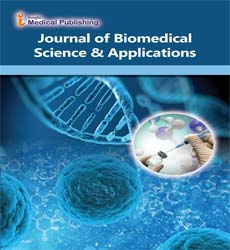Biomedical Science Contributions to Precision and Personalized Medicine
Parry Tetsuya
Department of Biomedical, Oregon Health & Science University, Portland, OR, USA
Corresponding author:
Parry Tetsuya,
Department of Biomedical, Oregon Health & Science University, Portland, OR, USA;
Email: parry@tetsuya.edu
Received date: January 01, 2025, Manuscript No. Ipbsa-25-20590; Editor assigned date: January 03, 2025, PreQC No. Ipbsa-25-20590(PQ); Reviewed date: January 15, 2025, QC No. Ipbsa-25-20590; Revised date: January 22, 2025, Manuscript No. Ipbsa-25-20590(R); Published date: January 28, 2025, DOI: 10.36648/ 2471-7975.9.1.02
Citation: Tetsuya P (2025) Biomedical Science Contributions to Precision and Personalized Medicine. J Biomed Sci Appl Vol.09 No.1: 02
Introduction
Biomedical science has become a cornerstone of precision and personalized medicine, offering scientific insights and technological advances that tailor healthcare to the unique biological, genetic, and environmental profiles of individuals. Unlike conventional approaches that rely on standardized treatments, precision medicine harnesses biomedical research to design interventions optimized for each patientâ??s condition, ensuring better outcomes and reduced adverse effects. By integrating genomics, molecular diagnostics, pharmacology, and data-driven healthcare strategies, biomedical science continues to reshape the way diseases are diagnosed, monitored and treated [1].Description
One of the primary contributions of biomedical science to personalized medicine is the advancement of genomic technologies. Whole-genome sequencing, transcriptomic analysis, and molecular profiling have enabled the identification of genetic variations that predispose individuals to specific diseases or influence their response to therapies. For example, oncology has benefited significantly from genomic-guided treatment plans where mutations in genes such as BRCA1/2, EGFR, or HER2 are used to select targeted therapies. These insights not only improve treatment success rates but also allow for early detection and preventive strategies, offering patients proactive healthcare solutions [2]. Biomedical science also plays a crucial role in the field of pharmacogenomics, which examines how genetic differences impact drug metabolism, efficacy, and safety. By studying enzymes such as CYP450 or genetic polymorphisms affecting drug transporters, researchers can predict how patients will respond to certain medications. This reduces the risk of adverse drug reactions and supports optimized drug dosing. In cardiovascular medicine, for example, pharmacogenomic testing guides the use of anticoagulants like warfarin, ensuring safer and more effective therapy. Such innovations underscore how biomedical research contributes direc directly to improving treatment precision [3]. Beyond genomics and pharmacogenomics, biomedical science integrates multi-omics approachesâ??such as proteomics, metabolomics, and microbiomicsâ??with clinical data to build comprehensive disease profiles. These integrated approaches are essential for understanding complex diseases like diabetes, autoimmune disorders, and neurological conditions, where multiple biological layers contribute to disease progression [4]. Additionally, advances in biomedical imaging, biomarkers, and computational modeling enhance cliniciansâ?? ability to monitor disease dynamics in real time, further personalizing treatment plans. Artificial intelligence and machine learning tools, driven by biomedical research, are now being used to predict patient outcomes, stratify risk, and optimize individualized care pathways [5].Conclusion
In conclusion, biomedical science has profoundly advanced precision and personalized medicine by providing the foundational knowledge, tools, and technologies needed to tailor healthcare at the individual level. From genomics-driven therapies to pharmacogenomics-guided prescriptions and multi-omics integration, biomedical contributions are ensuring more accurate diagnoses, targeted treatments, and preventive healthcare strategies. As research continues to evolve, the synergy between biomedical science and clinical practice will expand the possibilities of precision medicine, ultimately improving patient outcomes and transforming the future of global healthcare.References
- Evers BM (2006) Neurotensin and Growth of Normal and Neoplastic Tissues. Peptides 27: 2424-2433
Google Scholar Cross Ref Indexed at
- Seino Y, Fukushima M, Yabe D (2010) GIP and GLP-1, the Two Incretin Hormones: Similarities and Differences. J Diabetes Investig 1: 8-23
Google Scholar Cross Ref Indexed at
- Yabe D, Seino Y (2011) Two Incretin Hormones GLP-1 and GIP: Comparison of Their Actions in Insulin Secretion and β Cell Preservation. Prog Biophys Mol Biol 107: 248-256
Google Scholar Cross Ref Indexed at
- Sankaran S, Del Campo A (2019) Optoregulated Protein Release from an Engineered Living Material. Adv Biosyst 3: e1800312
Google Scholar Cross Ref Indexed at
- Powell-Tuck J, Hennessy E (2003) A Comparison of Mid Upper Arm Circumference, Body Mass Index and Weight Loss as Indices of Undernutrition in Acutely Hospitalized Patients. Clin Nutr 22: 307-312
Google Scholar Cross Ref Indexed at
Open Access Journals
- Aquaculture & Veterinary Science
- Chemistry & Chemical Sciences
- Clinical Sciences
- Engineering
- General Science
- Genetics & Molecular Biology
- Health Care & Nursing
- Immunology & Microbiology
- Materials Science
- Mathematics & Physics
- Medical Sciences
- Neurology & Psychiatry
- Oncology & Cancer Science
- Pharmaceutical Sciences
